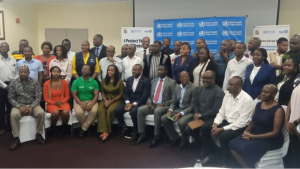Malawi Secures Gains Against Polio, Strengthens Health Systems for the Future
As Malawi celebrates its first anniversary after officially closing its reimported wild poliovirus (WPV1) outbreak, the country is taking strategic steps to sustain hard-won gains and strengthen its broader health system. On 24 April 2025, health leaders, partners, and stakeholders gathered for the National Polio Transition Planning meeting, an important milestone in ensuring that the infrastructure built to eradicate polio continues to serve Malawi’s communities for years to come.
From Polio Response to Long-Term Resilience
Polio resources - from trained personnel to disease surveillance systems-have played a key role in emergency health responses across Malawi. The transition planning process aims to protect these assets and ensure their integration into the national health system. In line with the Polio Transition Strategic Framework, Malawi’s plan supports national ownership of essential polio functions, including surveillance, immunization, and outbreak response.
“Transitioning from GPEI support means we must strengthen our ability to manage core functions nationally. This is vital to keep Malawi polio-free and improve our capacity to detect and respond to other vaccine-preventable diseases,” said Dr. Patrick Wataya Chirwa, Chair of the National Certification Committee.
In May 2020, Malawi (alongside the rest of the African Region) was certified free of indigenous wild poliovirus. However, the detection of a reimported case from Southern Asia in 2022 served as a powerful reminder that polio remains a global threat. Malawi’s health authorities responded swiftly and decisively, successfully interrupting transmission by May 2024.
By January 2025, the Global Polio Eradication Initiative (GPEI) had classified the country as low-risk on its global polio watchlist—a testament to Malawi’s strong response and surveillance systems.
However, maintaining that status means planning for the future. As external polio funding declines, Malawi must close gaps in workforce and financing. The Polio Transition Plan will help secure critical capacities and align them with the Ministry of Health-led Immunization Programme, reinforcing the country’s ability to prevent and respond to outbreaks.
Sarah Wanyoike, from WHO AFRO’s Eastern and Southern Africa inter-country support team, highlighted how lessons from Malawi’s recent outbreak response can shape a stronger, more resilient health system. “We must integrate service delivery and strengthen surveillance across the board—not just for polio, but for all vaccine-preventable diseases,” she said.
The plan focuses on optimizing existing systems, integrating surveillance efforts, and building multisectoral collaboration, linking immunization, emergency preparedness, One Health approaches, and community engagement.
At the meeting, Dr. Neema Kimambo, WHO Representative to Malawi, emphasized that the transition is not just a health sector responsibility. It requires cross-cutting collaboration among government agencies, local health authorities, partners, and civil society.
“Malawi’s success will depend on strong coordination between the Ministry of Health, EPI, the Public Health Institute of Malawi, district councils, health partners, NGOs, and communities themselves,” Dr. Kimambo noted.
These efforts aim to ensure that the systems and knowledge built through the polio programme continue to benefit Malawians, supporting everything from emergency response to routine immunization and disease surveillance.
Malawi’s National Polio Transition Plan is a blueprint not only for sustaining polio eradication efforts but also for advancing universal health coverage and equity. As the country moves from emergency response to long-term resilience, WHO and partners remain committed to supporting a smooth and sustainable transition—helping Malawi stay polio-free and healthier for generations to come.



